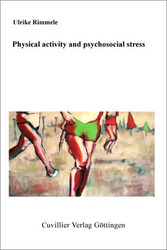| Areas | |
|---|---|
| Serie de libros (97) |
1382
|
| Nachhaltigkeit |
3
|
| Gesundheitswesen |
1
|
| Letra |
2372
|
| Medienwissenschaften | 16 |
| Teología | 57 |
| Filosofía | 102 |
| Derecho | 423 |
| Economía | 853 |
| Ciencias sociales | 417 |
| Ciencias del deporte | 48 |
| Psicología | 233 |
| Educación | 190 |
| Historia | 183 |
| Arte | 111 |
| Ciencias culturales | 166 |
| Literatur | 117 |
| Lingüística | 89 |
| Ciencias Naturales |
5408
|
| Ciencias Ingeniería |
1798
|
| General |
98
|
|
Leitlinien Unfallchirurgie
5. Auflage bestellen |
|
Erweiterte Suche
Physical activity and psychosocial stress (Tienda española)
Ulrike Rimmele (Autor)Previo
Indice, Datei (48 KB)
Lectura de prueba, Datei (150 KB)
Physical activity has proven benefits for physical and psychological well-being and is associated with reduced responsiveness to physical stress. However, it is not clear to what extent physical activity also modulates responsiveness to psychosocial stress. A better understanding of the preventive role of physical activity in stress responsiveness may have direct clinical implications with major public health significance.
The first study presented in this thesis examined whether different levels of physical activity modulate adrenal, autonomic, and subjective responses to an acute psychosocial stressor. Twenty-two trained men (elite sportsmen) and 22 healthy untrained men were exposed to the standardized psychosocial laboratory stressor, Trier Social Stress Test. Salivary free cortisol levels, heart rate, anxiety, mood, and calmness were repeatedly measured before and after stress exposure. In response to the stressor, cortisol levels and heart rate were significantly increased in all subjects. However, trained men exhibited significantly lower cortisol and heart rate responses to the stressor compared to untrained men. In addition, trained men showed significantly higher calmness and better mood, and marginally lower state anxiety. Elite sportsmen also exhibited significantly higher levels in self-efficacy. However, self-efficacy did not moderate stress reactivity. Taken together, trained men showed reduced reactivity to a psychosocial stressor, characterized by lower adrenocortical, autonomic, and psychological stress responses, independent of higher levels of self-efficacy. In the second empirical study presented in this thesis, we set out to determine possible moderating variables of the reduced physiological and psychological stress responses to a psychosocial stressor in elite sportsmen compared to untrained men. Elite sportsmen and untrained men differ not only in physical activity levels, but also in their psychological make-up and coping strategies, which may play a role for stress reactivity. Thus we investigated 100 male subjects with different physical activity levels (elite sportsmen, amateur sportsmen and untrained men). Specifically, we compared the combined influences of physical activity, psychological make-up (self-efficacy and competitiveness), and appraisal and coping strategies on psychosocial stress reactivity. Fitness levels were determined through lactate tests and by self reports of training regimes. As in the first study, psychosocial stress was induced with the highly standardized Trier Social Stress Test and psychological and physiological stress responses were assessed with measurements of changes in state anxiety, mood, calmness, heart rate, and free salivary cortisol levels. The three groups differed significantly in fitness levels, competitiveness levels, trait anxiety, and self-efficacy, as well as in appraisal and coping. Further analyses showed that stress reactivity varied with physical activity levels, in that elite sportsmen showed lower cortisol and cardiovascular reactivity, and state anxiety responses. Amateur sportsmen showed similar reactivity as elite sportsmen in cardiovascular and psychological parameters, but similar cortisol responses as untrained men. Competitiveness significantly influenced heart rate reactivity. Also, trait anxiety significantly influenced state anxiety responses. In addition, primary appraisal had a marginal effect on cortisol responses. These results may provide further evidence for a protective effect of physical activity against stress-related disorders and can be taken as a foundation for intervention studies in healthy and clinical populations.
| ISBN-10 (Impresion) | 3867273022 |
| ISBN-13 (Impresion) | 9783867273022 |
| ISBN-13 (E-Book) | 9783736923027 |
| Formato | A5 |
| Idioma | Inglés |
| Numero de paginas | 116 |
| Edicion | 1 |
| Volumen | 0 |
| Lugar de publicacion | Göttingen |
| Lugar de la disertacion | Zürich |
| Fecha de publicacion | 23.07.2007 |
| Clasificacion simple | Tesis doctoral |
| Area |
Ciencias del deporte
Psicología |








